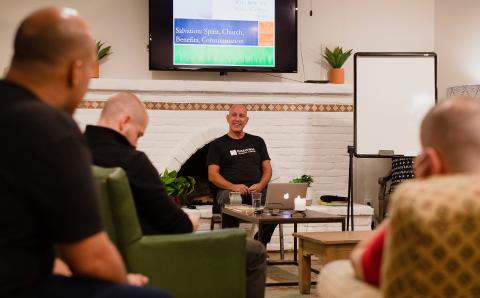“How do you pastorally tell the truth of the Good Friday story without retraumatizing and injuring those in your midst?”
The question stumped the panel. Between the six of us, we figured out that we had a septugenarian’s worth of years of experience in leading worship ministry in the church. Yet this question led all of us into a moment of silence and deep reflection.
This panel of six pastors and worship leaders from the Christian Reformed Church and the Reformed Church in America was discussing Holy Week and Easter worship planning at the annual worship symposium hosted by the Calvin Institute of Christian Worship. We had covered topics such as intergenerational worship ideas, best practices for Palm Sunday, and creative ideas for contemplating the stations of the cross. Many useful and practical ideas were shared, and panel and audience alike were mentally taking notes for their own services.
But when we opened the floor to questions, we turned from practical and creative to pastoral and truthful.
“All of our congregations have someone who has been the victim of trauma or abuse,” one participant said. “This includes our children. How do you pastorally tell the truth of the Good Friday story without retraumatizing and injuring those in your midst?”
Several panelists weighed in. We talked about the importance of knowing your congregation well and being aware of people’s stories. We recognized that there are people who walk through the doors of a church fewer than five times a year. These visitors might not know what they are coming into. We need to be missionally sensitive, particularly during “high” seasonal services. We also wondered about the theological implications of minimizing Jesus’ suffering and death in the message of Good Friday.
The variety of answers to that one question demonstrated to us, and to the room, that there was no easy answer.
As more churches discuss what it means to be a trauma-informed congregation, questions like this will continue to emerge, and leaders will be asked to make wise and pastoral decisions to protect the vulnerable in their pews. They will tackle questions such as:
- How can we be leaders and congregations that speak and proclaim truth?
- How are we forming empathetic worshipers who care for one another not only in their interactions, but in their worship practices?
- How do we lead congregations to faithfully tell God’s story year after year in a way that leads to redemptive healing and shalom?
Thrive is grateful for its partnership with the Calvin Institute of Christian Worship, not only for the invitation to participate in its annual worship symposium, but also for the desire we share to see worship renewal in Christian Reformed congregations. We hope that each of our efforts plants a small seed in congregations across the denomination. As these seeds are cultivated and nurtured, we begin to see the beauty of faithful and vibrant worship practices growing throughout the CRC.
Churches interested in learning more about becoming trauma-informed can connect with Thrive. Our staff is ready to walk alongside you through both practical and pastoral concerns. Our abuse awareness resources have a particular focus on trauma-informed ministry. We have skilled practitioners available for consulting and training. We are eager to hear your stories and partner with you in your journey.
About the Author
Katie Ritsema-Roelofs is a commissioned pastor in the Christian Reformed Church and serves as the worship consultant for Thrive, the denomination's agency focused on equipping and encouraging congregations. She also serves as the director for the Worship for Workers initiative at Fuller Seminary. She and her family live in the greater Washington, D.C. area.









